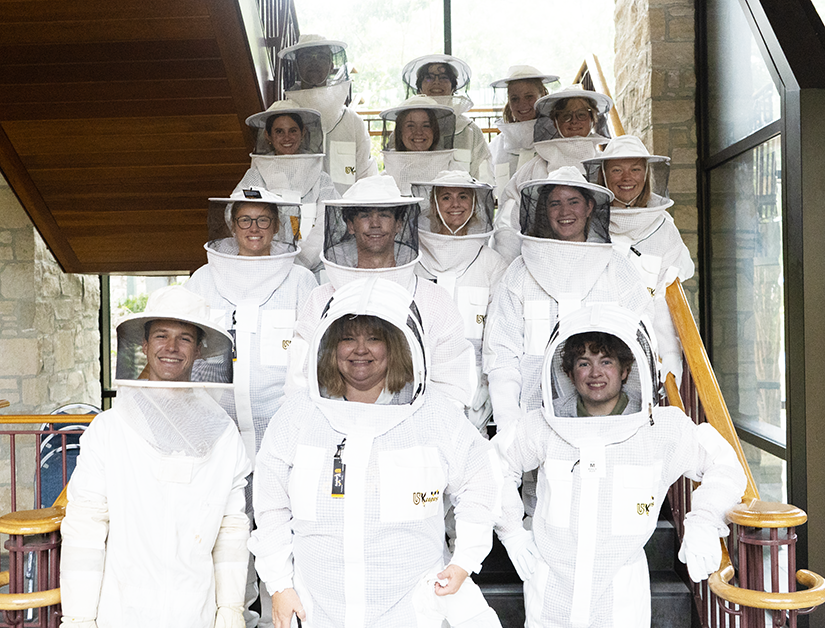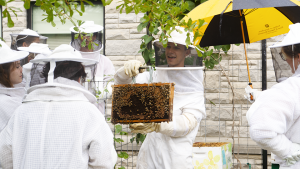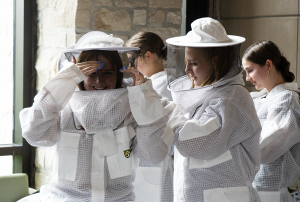
A member of the board of advisors for the Boone Regional Beekeepers Association and a beekeeping project leader for Sustain Mizzou, George Frees has shared his bee expertise with a variety of audiences across Missouri over the years. Community members, elementary students and various school groups have all benefited from his knowledge and instruction on caring for one of the world’s most important pollinators.
Frees is now bringing that passion to University of Missouri Honors College students. Frees, a junior biochemistry and plant sciences double major, is co-teaching an Honors Seminar with Bethany Stone, Curators’ Distinguished Teaching Professor of Biological Sciences, titled, What’s the Buzz About Bees? An Interdisciplinary Study of Beekeeping.

“It’s really incredible that the Honors College is allowing me to step into this role and is supporting my passion,” said Frees, a Stamps Scholar who is also pursuing the Honors Certificate at Mizzou. “Honors students are so dedicated, and it’s been amazing to work with and alongside them in this role. One of the best things about the Honors College is the opportunity to have these in-depth discussions with a small group of students. Having the chance to lead one of those discussions is awesome. I’m so appreciative of this opportunity.”
Frees began caring for bees at Mizzou before he officially became a Tiger. His older brother Henry, an MU alum, led the beekeeping club while he was on campus, and a high school Frees would fill in for him every so often. Once Frees made the decision to come to Mizzou, he took on a larger role.
As a strong advocate for bees at Mizzou, Frees is hoping to bring more awareness to their importance through the Honors Seminar – and spark others to continue the care after Frees graduates.
“A staple of the Honors College is providing students with exceptional experiential learning opportunities,” said Catherine Rymph, dean of the Honors College. “While it is typically faculty who are offering to share their unique expertise with Honors students, it’s exciting to see George step into that role. We’re so supportive of his efforts.”
Frees worked with Rymph and Rachel Harper, an associate dean in the Honors College, as well as Stone, to make the class a reality. Stone is playing a vital role in the seminar, providing faculty oversight and lending guidance with course structure and teaching methods. Frees and Stone are preparing lesson plans together and sharing responsibilities, something that Stone said she has enjoyed.
“I love that George is taking something that he saw as a void on campus and filling it,” Stone said. “He knows there is a lot of interest in this topic and looked at how he could provide information to help others. This is such a creative and exciting way to provide that instruction.
“At the end of the day, this is all George. He has such a heart for the bees and does an incredible job of sharing that interest with others. I’m really grateful to be a part of it.”
The weekly seminar includes 12 Honors students – and features plenty of informative discussions. Students learn not only about the importance of bees and how to care for them, but also how bees are portrayed more broadly, like in literature. Safety protocols are also discussed as the students have an opportunity to throw on their own beekeeping gear and interact with the bees.

“This is definitely a new challenge for me,” Frees said. “While I’ve taught before, co-leading a long-term course at a university level is much different. This isn’t a simple hands-on activity or one-day conference. This is a continuous educational experience, and I’m working to build a curriculum that hopefully endures. My goal is for this seminar to be relevant for years to come.”
While Frees and Stone build weekly lessons to share with the class, they are learning plenty from the students, too.
“So many of the students are finding resources that I haven’t seen before, so that’s been really awesome to talk through,” Frees said. “It’s been so rewarding to be in that type of atmosphere.”
Growing up in Harrisonville, Missouri, Frees and his family joined the Midwestern Beekeepers Association when Frees was just 7 years old. That was a full two years after Frees discovered how much he enjoyed learning about bees. His interest has only grown over the years, which has led to numerous opportunities to share his knowledge with a wider audience.
“It’s amazing to have the opportunity to do something that I love,” Frees said. “I get to teach others about beekeeping and share why I’m passionate about caring for the bees and the environment. There’s really nothing better.”
Working with Stone and helping lead the class has also created a new interest for Frees – one that he didn’t foresee when he began this journey.
“I never thought I would be interested in teaching as a career, but I’ve really enjoyed this experience,” Frees said. “It has sparked a desire to pursue a university teaching position in the future. Whatever happens, I do know that this has been beyond rewarding in so many capacities.”